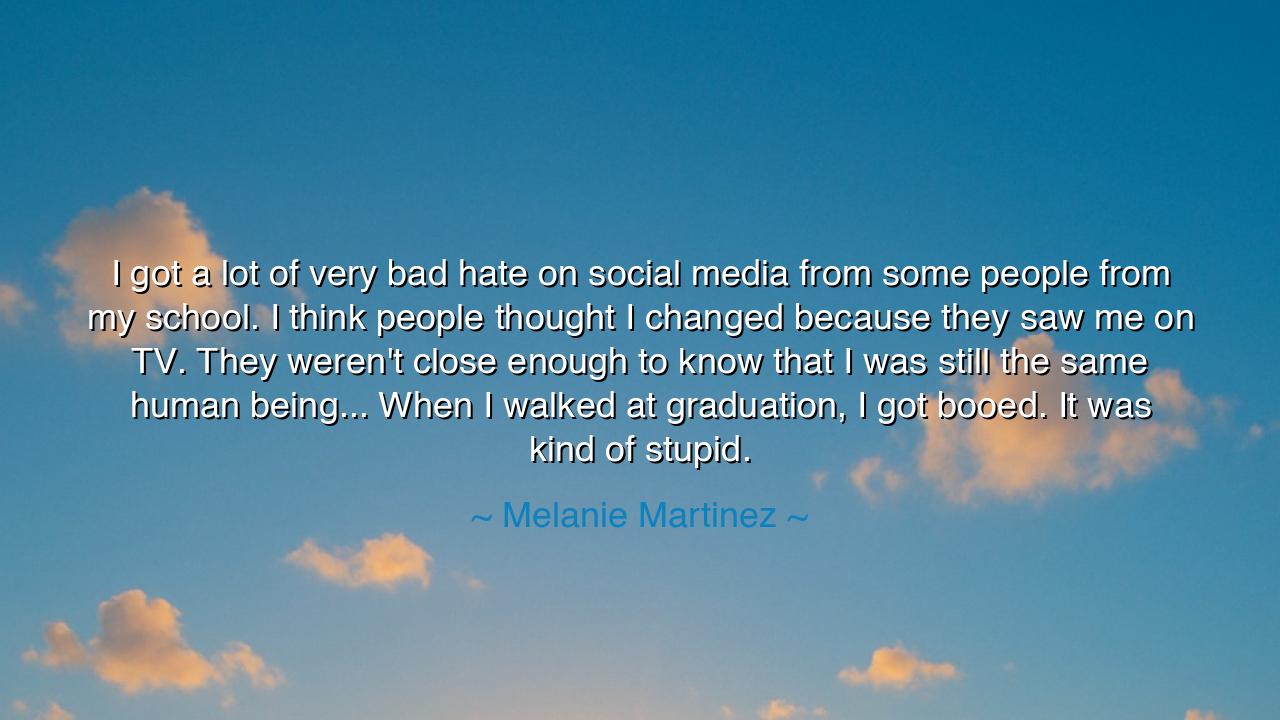
I got a lot of very bad hate on social media from some people
I got a lot of very bad hate on social media from some people from my school. I think people thought I changed because they saw me on TV. They weren't close enough to know that I was still the same human being... When I walked at graduation, I got booed. It was kind of stupid.






The words of Melanie Martinez — “I got a lot of very bad hate on social media from some people from my school. I think people thought I changed because they saw me on TV. They weren’t close enough to know that I was still the same human being... When I walked at graduation, I got booed. It was kind of stupid.” — carry the weight of sorrow and awakening. Beneath their simplicity lies a profound reflection on fame, misunderstanding, and the loneliness that often accompanies growth. In her lament, we hear the eternal cry of the misunderstood — the soul who has stepped beyond the familiar, only to find that those she once knew can no longer see her clearly. It is a story as old as time, a tale of transformation and the pain of separation between who we were and who we are becoming.
When Melanie speaks of being booed at graduation, she describes more than a moment of cruelty — she reveals a truth about human nature. People often fear change in others, for it reminds them of their own inertia. They see someone rise, evolve, or step into light, and instead of rejoicing, they recoil. The same voices that once cheered can turn to scorn when one among them dares to step beyond their understanding. What hurt her most was not the booing itself, but the blindness behind it — the failure of those who knew her to still see her humanity. It is one of life’s most painful trials: to remain oneself while the world insists on seeing only its reflection of you.
The ancients, too, knew this sorrow well. Socrates, the philosopher of Athens, was condemned not for evil, but for being different — for daring to question and awaken the people around him. His wisdom was seen as arrogance, his insight as danger. Likewise, Joan of Arc, called by divine voices to lead her people, was mocked and reviled by those she sought to save. Both faced hostility not because they changed, but because they dared to become more fully themselves. So too did Melanie face a smaller, yet deeply personal form of this same rejection — not from strangers, but from those who once called her friend.
Her experience also speaks to the modern curse of social media, where judgment travels faster than understanding, and where people mistake visibility for transformation. To be seen on a screen is to be projected upon — the world no longer sees the soul, only the symbol. The girl who once walked the school halls becomes a figure, a fantasy, a story people tell about fame. And yet, behind the screens and headlines, she remains — a young woman still learning, still tender, still human. Her pain reveals the spiritual cost of being visible in a world that prefers illusions to truth.
And yet, from such pain can come great wisdom. For the one who endures misunderstanding learns a priceless truth: that identity must be rooted within, not in the approval of others. The applause of the crowd and the booing of the crowd are two faces of the same emptiness — neither can define who you are. To be booed while walking at graduation is to walk through the fire of public judgment and emerge untouched by it. Those who can endure rejection with grace become, in time, unshakable. They learn the art of standing alone without bitterness, of remaining kind without surrendering their authenticity.
History gives us countless examples of those who have faced this same trial. Galileo, who saw the stars differently than others, was ridiculed and silenced for his discoveries. Yet centuries later, the world vindicated his truth. So it is with all who walk ahead of their time — artists, thinkers, visionaries — their courage to grow will always unsettle those who prefer stillness. But the wise know that growth, even when misunderstood, is the highest calling of the soul. To stay unchanged for the comfort of others is to betray one’s own potential.
So let this be the teaching, O listener: when the world mocks your becoming, keep walking. When they say you have changed, answer only with integrity. For those who truly know you — the few who see with love rather than fear — will recognize that your essence remains untouched. The tree that grows taller is not betraying its roots; it is fulfilling them. Let your growth be your defense, your perseverance your response. In time, the same voices that once doubted you will fall silent before your light.
For as Melanie Martinez reminds us, the world will often misjudge the one who dares to grow. But remember this: being booed at your own graduation is not a curse — it is a symbol. It means you have already begun to rise beyond the smallness of others’ expectations. And when you rise, rise with love. Remain yourself, even when they cannot see you. For the one who endures misunderstanding with grace becomes what the ancients called noble — steadfast, compassionate, and unbroken before the winds of the world.






AAdministratorAdministrator
Welcome, honored guests. Please leave a comment, we will respond soon